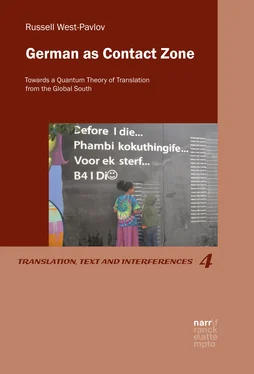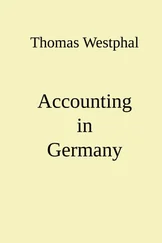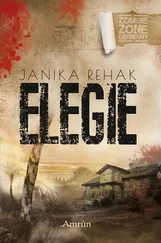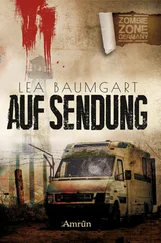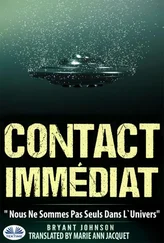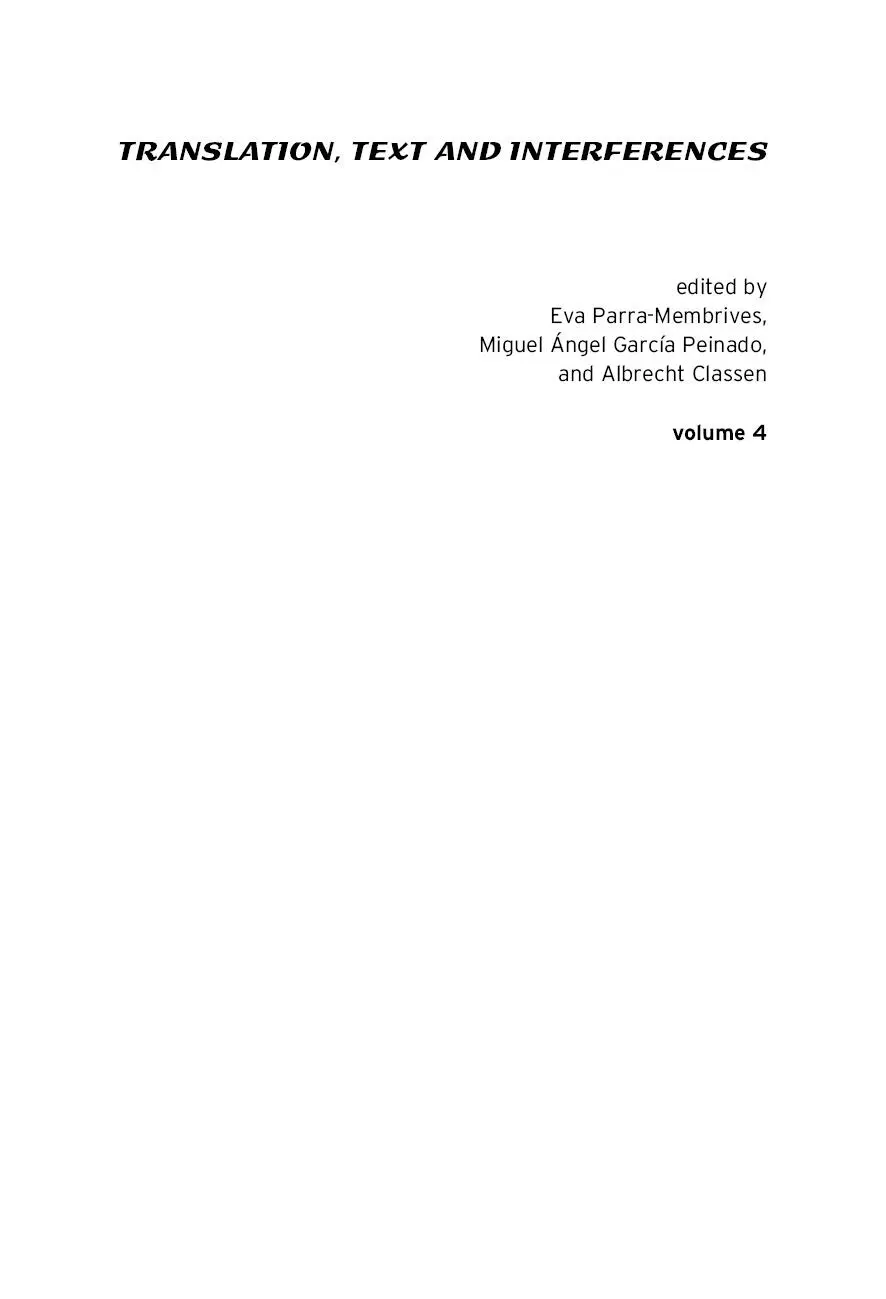
Russell West-Pavlov
German as a Contact Zone
Towards a Quantum Theory of Translation from the Global South
Narr Francke Attempto Verlag Tübingen
[bad img format]
© 2019 • Narr Francke Attempto Verlag GmbH + Co. KG
Dischingerweg 5 • D-72070 Tübingen
www.narr.de• info@narr.de
Das Werk einschließlich aller seiner Teile ist urheberrechtlich geschützt. Jede Verwertung außerhalb der engen Grenzen des Urheberrechtsgesetzes ist ohne Zustimmung des Verlages unzulässig und strafbar. Das gilt insbesondere für Vervielfältigungen, Übersetzungen, Mikroverfilmungen und die Einspeicherung und Verarbeitung in elektronischen Systemen.
ISBN 978-3-8233-8143-3 (Print)
ISBN 978-3-8233-0173-8 (ePub)
This book emerged in tandem with and in the wake of the long drawn-out process of my acquisition, after two decades of residence in the Federal Republic, of German nationality. Like many others in my situation, the application for German citizenship ran parallel to the effort to retain the prior nationality—a stumbling block for German legal tradition. According to a long-standing principle within German citizenship law dual nationality is to be ‘avoided’ (an exception is made for EU citizens). It is however gradually becoming the de facto norm in naturalization procedures (von Münch 2007: 159-72); in 2006 the proportion of naturalizations with retention of the prior nationality for the first time exceeded the 50 %-mark and has been rising slowly ever since, reaching almost 65 % a decade and a half later (Worbs 2008: 26; Bundesbeauftragte für Integration 2016: 433; Statistisches Bundesamt 2018: 126). My experience was thus illustrative of the curious anomaly of a nation that clings, at the level of official discourse, to a legal concept of a singular national identity but, at the level of quotidian administrative practice, increasingly admits more complex configurations of plurinationality. Draft bills seeking to harmonize the juridical framework of citizenship with a slow but ineluctable diversification of civil society have repeatedly been tabled in the Bundestag since the mid-1990s (Deutscher Bundestag 1995); perhaps the shelf-life of this book will witness the genuine inauguration of German citizenship regulations as a happily hybrid contact zone unburdened by assumptions of normative mononationality.
For their generous support in the lodging of the dual citizenship application I would like to thank Karin Amos, Frank Baasner, Robert Dixon, Bernd Engler, Martin Hertkorn, Jürgen Leonhardt, Philip Mead, Dorothea Rüland, Monique Scheer, Bernd Villhauer and Andrew J. Webber.
Thanks are also due to many others as they have aided me in my journeys in and out of my own ‘German contact zones’: to Rhys Bezzant, who taught me the rudiments of the German language in Melbourne; to Dieter Buff, who mentored me during my first teaching posting at Pascal-Gymnasium, Münster; to Catherine Proescholdt, who tutored me through the Cambridge German Diploma that, two decades later, aided me in the naturalization procedure; to Helmut Peitsch, who guided me in my first steps into the world of German scholarship from the far shores of South Wales and has remained a friend and mentor ever since; and to Matthias N. Lorenz, a close friend and valued colleague since my time in Lüneburg (and who assisted in procuring a copy of the film by Sissako with which I open this volume).
Going back even further in my own diasporic-exilic academic biography, I would like to acknowledge those academic mentors who supervised my early work on translation studies: Marion Campbell at the University of Melbourne in my honours year; and Jean-Pierre Guillerm at the Université de Lille III and Maud Ellmann at the University of Cambridge for my respective doctorates.
A special word of thanks is also due to John Kinsella, sometime Public Intellectual Visiting Fellow in the Tübingen ‘Literary Cultures of the Global South’ project in 2016, co-author, debating and walking companion, and a figure in one of the chapters in this book—and to our colleague and common friend Philip Mead, who put us in contact, thinking we might have some interesting things to say to each other. Likewise, I am grateful to Ivan Vladislavić, Thomas Brückner and Mark Sanders, who came to Tübingen for a memorable workshop on ‘Translating South Africa’ in 2016; discussions with them have likewise resulted in a chapter in this book. A subsequent discussion with John Kinsella on the slopes of the Achalm in 2018 contributed some important ideas to that chapter as well. Thanks more generally to Thomas Brückner, Michael Hulse and Katharina Meyer for direct feedback on my chapters about their translations. An ongoing dialogue with Sudesh Mishra has contributed much to the book. Susana Garbe and Johannes Garbe gave useful comments on some of the material in the chapters on literary translations. And of course to Anya Heise-von der Lippe, Matthias Schmerold and Joseph Steinberg for technical advice and support and for their assistance in the preparation of the text, many thanks are due. Thanks to the anonymous external reader who made valuable suggestions for improving the text at a late stage in its genesis.
I am grateful to Fernando Resende and Beatriz Polianov for giving permission to reprint a version of an article that originally appeared in Contracampo in 2017 (chapter 11). I am similarly grateful to Suman Gupta, Satnam Virdee and Amanda Estell-Bleakley for giving permission to reprint as chapter 13 a longer version of an essay previously published in a special number of Ethnic and Racial Studies under their guest editorship. The chapter is derived in part from the article in ERS published on 15 June 2018 and available online at: wwww.tandfonline.com/[https://doi.org/10.1080/01419870.2018.1468918].
Thanks are due to the following publishers for permission to reprint selections from the work of the poets I have discussed: to Arc (Todmorden) for reprint lines from John Kinsella’s Poems ‘After “Friedensfeier”’, ‘After Hölderlin’s ‘Walk’”, ‘Subtexting “Der Spaziergang”’, ‘Searching “Der Spaziergang”’, and ‘After Hölderlin’s “Der Winkel von Hardt”’, in The Wound (2018); to Jonathan Cape (London) (via Farrar Straus and Giroux), for permission to reprint lines from ‘The Star Apple Kingdom’ in Derek Walcott’s The Star-Apple Kingdom (1980); to Carcanet (Manchester), for permission to cite Michael Hamburger’s Hölderlin translations ‘The Nook at Hardt’, ‘Celebration of Peace’, and ‘The Walk’ from Friedrich Hölderlin: Poems and Fragements (Anvil, 2004); to Farrar Straus and Giroux (New York), for permission to reprint lines from Pierre Joris’ Celan translations in Breathturn (2016) and from Walcott’s ‘The Morning Moon’, ‘The Return to the Trees’, and North and South’ in Collected Poems 1948-84 (1986); to Hanser (Munich), to reprint lines from Klaus Martens’ translation of Walcott’s poems ‘Das Königreich des Sternapfels’ in the volume of the same name (1989), and ‘Der Morgenmond’ in Erzählungen von den Inseln (1993); and to Suhrkamp (Berlin) for permission to reprintlines from Celan’s Die Gedichte (2003) and Eich’s Träume (1953/1973).
I wish to register my debt to the German Federal Ministry of Research (BMBF) and the German Academic Exchnage Service (DAAD) for support for this publication via the Thematic Network project ‘Literary Cultures of the Global South’ (grant no. 57373684).
Читать дальше
